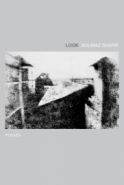
Book Review: Look by Solmaz Sharif

Look
Poems by Solmaz Sharif
Graywolf Press, July 2016
ISBN-13: 978-1-555977443
$16.00; 112pp.
Reviewed by Phillip West
Solmaz Sharif’s debut collection, Look, is a brilliant dive into how war affects people and language.
As a first-generation daughter of Iranian parents, war wasn’t first-hand for Sharif; “How could she say the things she does not know.” the speaker ponders in the formidable fragment series “Personal Effects.” But war nonetheless persists in the speaker’s history and present. “I burn my finger on the broiler and smell trenches” rings a refrain in the collection’s closing poem, “Coda.”
In this way, Sharif’s second-hand war is a first-hand war of her own. (Again, from “Personal Effects”):
According to most
definitions, I have never
been at war.
According to mine,
most of my life
spent there.
The pervading motif throughout Look is Sharif’s use of terms plucked from the Department of Defense Dictionary of Military and Associated Terms. This book of morally sanitized nomenclature—consisting of terms like THERMAL SHADOW, NEUTRALIZED, PERSON ELIGIBLE TO RECEIVE EFFECTS—is cunningly turned against itself, as Sharif calls attention to phrases that beg anonymity and are shrouded in euphemism. In “Battlefield Illumination,” Sharif re-fangs the term DESTRUCTION RADIUS:
limited to blast site
and not the brother abroad
who answers his phone
then falls against the counter
or punches a cabinet door
Form plays a critical role in Look through sequences, fragments, shards, and lists that induce the reader to search through post-war rubble. In “Personal Effects,” Sharif writes a fragment about a photo of a soldier holding a bazooka (his smile “ruining the picture”). Next, in “Reaching Guantanamo,” she writes a series of letters to a Guantanamo prisoner, letters that have been edited, presumably, by a prison official. One note begins:
Dear Salim,
Lightning across the sky all night, lighting up my .
but no rain. No .
when I get home, everything is
………………………………dust.
This redacted, bombed-out, war-torn form slightly disorients the reader, who can still piece together the larger picture, the larger struggle.
In the vein of Claudia Rankine’s Citizen, Look is, at its core, a political call to attention: If we are to combat the effects of war on people and language, we must first understand how war permeates our society and culture. To this end, Look is not only relevant, but eye opening.
Phillip West is an amateur escape artist from Los Angeles, CA. For his next death-defying feat, he will move to NYC and attempt to make a living. His work hasn’t appeared anywhere yet (except for LAR), but he’s received some encouraging rejections as of late. Barring any unforeseen complications, he expects to earn his MFA degree by 2018, and perhaps a Pulitzer or two.

Leave a Reply